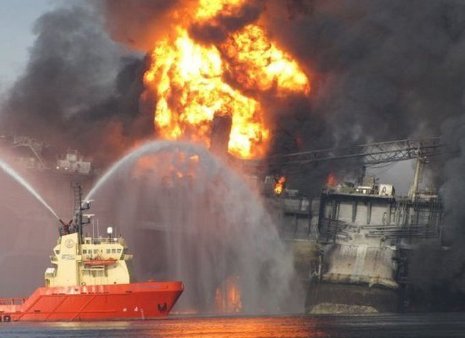 As nearly everyone knows, twelve days ago the oil rig Deepwater Horizon caught fire in the Gulf of Mexico and sank. The tragedy resulted in a loss of eleven lives and is leading to one of the worst environmental disasters in history. When the rig first sank two days after it had caught fire, there was faint optimism the rigs link to the oil reserve was shutoff. There was also hope blowout prevention devices would have triggered an automatic sealing off of the well.
As nearly everyone knows, twelve days ago the oil rig Deepwater Horizon caught fire in the Gulf of Mexico and sank. The tragedy resulted in a loss of eleven lives and is leading to one of the worst environmental disasters in history. When the rig first sank two days after it had caught fire, there was faint optimism the rigs link to the oil reserve was shutoff. There was also hope blowout prevention devices would have triggered an automatic sealing off of the well.
To the horror of the nation, especially the coastal communities and economies in the gulf, oil was in fact spewing from the site of the catastrophe. Experts initially estimated the ruptured pipe was dumping 1,000 barrels (42,000 gallons) of oil per day. Soon after, that number was updated to 5,000 barrels, a number BP and the administration continue to confirm (Wall Street Journal). However, some, as suggested by the U.S. Coast Guard, fear this number is a low ball estimate and as much as 25,000 barrels (1,050,000 gallons) of oil are pouring out of the leaking pipes.
I, as well as many others at home, sit back and watch with dismay and sickness as vain attempts are made to slow down the expansion of the oil slick. Oceans are set aflame, nets are strung along the coastline, and chemicals are dumped into waters to break apart the oil. Alas these efforts have not done enough to keep oil from reaching shore. But how much damage can be prevented while BP continues to scramble to find a way to cut off the source of the leak?
Many news articles I've read the past few days believe it will be reality this spill surpasses the Exxon Valdez disaster. In 1989, the sinking of the Valdez tanker led to the release of 11 million gallons of oil in Alaskan waters. Hopefully this somber comparison does not come true.
Amongst many other important concerns and necessary reactions this spill requires from our government and our people, I hope this event leads to a new demeanor and a more intentional desire to migrate our country away from oil. There are many reasons alternative fuels make sense, one of them is the environmental benefits they bring and, in wake of the catastrophic spill wreaking havoc on the gulf waters this very moment, the environmental risk aversion they offer.
We can debate the degree to which various alternative fuels lessen offsets, we can engage in conversation over which alternative fuels offer the longest term solutions, we can consider the new challenges alternative fuels may impose as they become more mainstream. However, we cannot deny the unavoidable damage oil has caused, is causing, and will continue to cause to our world and our communities. Alternative fuels is the future and out of this tragedy I hope a stronger effort is made to make that future come as soon as possible.
(Timeline of events up to May 2)

Comments
Add a New Comment
Log in to leave a comment or Create an Account
MNBenz | Posted May 05
Definitely. Yesterday at the In the Keynote address for BBI’s International Biomass Conference & Expo Syngest CEO Jack Oswald led attendees in chants of “Till Baby Till!". I think the Gulf disaster has put the "Drill Baby Drill" line to rest...
bartk005 | Posted May 03
This is unacceptable, even oil companies must know this has gone to far.
» Comments RSS